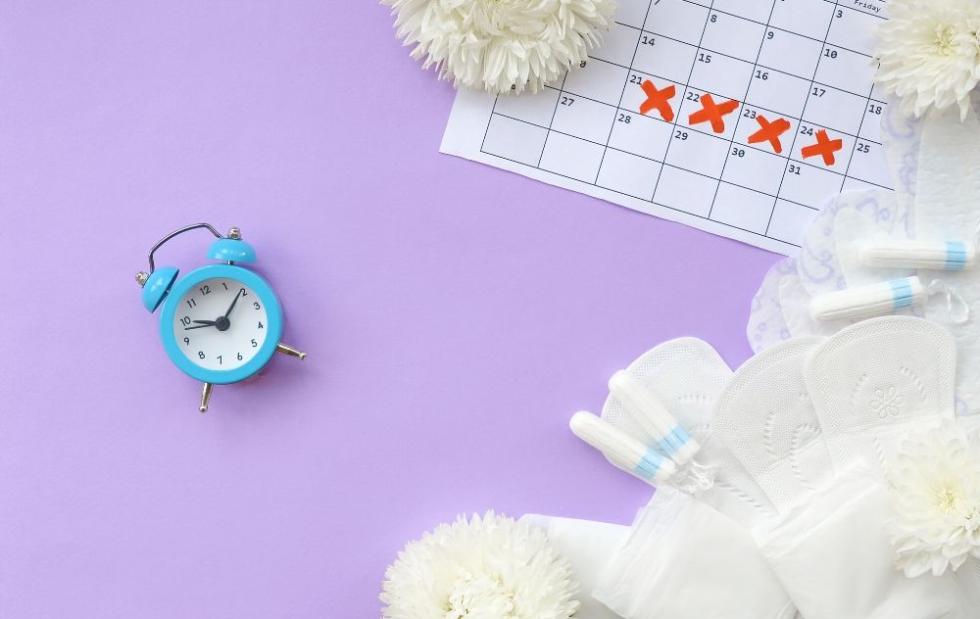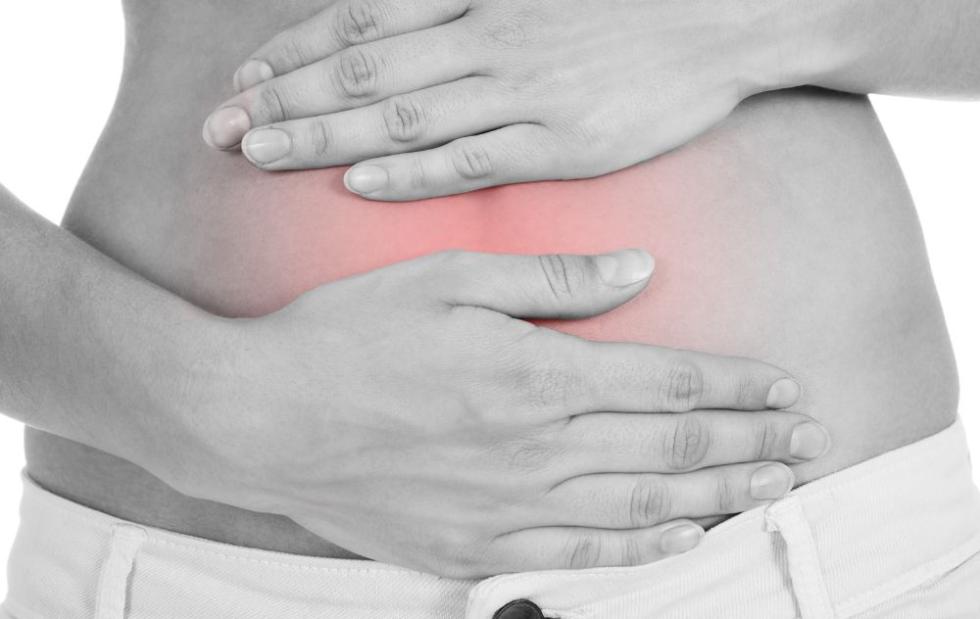
Table of Contents:
- What Is an Irregular Period?
- Causes of Irregular Periods
- Common Fibroid Symptoms
- How to Treat Irregular Periods
- Fibroid Removal Options
- Treatment at USA Fibroid Centers
What Is an Irregular Period?
Having your period is one thing you can expect every month for a large portion of your life. However, sometimes the monthly flow can become unpredictable. Some women get their periods like clockwork; others may experience an irregular period or severely painful PMS symptoms that last for days. You may even experience a heavy period flow that impacts your daily activities.
If you’re wondering what is considered heavy period bleeding, let’s define what is considered normal menstruation.
Your menstrual cycle starts from the first day of your period until the start of your next period. On average, women experience a period every 24 days to 38 days. According to the Office on Women’s Health report, an irregular menstrual cycle is classified as either longer than 35 days or shorter than 21 days. Heavy period bleeding, or menorrhagia, refers to prolonged menstrual flow or involves a heavy flow rate.
Signs of a heavy period flow include:
- Soaking through one or more pads or tampons an hour
- Doubling up on sanitary products
- Waking up to change pads or tampons during the night
- Periods that last longer than a week
- Passing menstrual blood clots that are larger than a quarter
- Inability to perform normal daily activities due to heavy period flow
- Development of anemia
Causes of Irregular Periods
So then, what causes heavy periods and other menstrual irregularities? An abnormal period is a common symptom that can indicate various health conditions.
Although not all of the causes for an irregular period are concerning, it can still be beneficial to visit an OBGYN or specialist to determine the cause of your symptoms. Below, we’ve listed some potential reasons for irregular periods.

1. Pregnancy
Sometimes, pregnancy can lead you to miss your period or even experience spotting, red, dark brown, pink blood, or blood lighter than what you normally experience. The most common early pregnancy symptoms include morning sickness, sensitivity to smells, nausea, fatigue, breast tenderness, or tingling.
If you miss your periods and are experiencing these symptoms, it could be due to pregnancy. However, it’s always better to meet with a gynecologist when you notice these symptoms.
It’s completely possible to get pregnant while having an irregular period. However, it may be more difficult. This is because irregular periods usually interfere with your body’s ovulation schedule. While it is possible to get pregnant during your cycle, it has been proven that conception is more successful during ovulation.
If you are pregnant and experience bleeding that resembles a heavy period flow, seek emergency medical care. Any type of bleeding during pregnancy can be a sign of complications.
2. Stress
Stress triggers a process called anovulation. Because of that process, you may not release your monthly egg like you’re supposed to. When your body secretes cortisol—a steroid hormone—in higher volumes than usual, it may imbalance sex hormones. These hormones are necessary for regulating ovulation.
Anxiety and stress play a major role in regulating your body’s mood.
Some stress can be good to challenge yourself, but too much can harm your health. Our bodies are quite sensitive to stress; it can interfere with how we normally function. For example, too much stress can disrupt the digestive system, causing frequent urination, abdominal pain, and diarrhea.
Your reproductive system also takes a hit when you are too stressed. For some women, stress can cause missed or irregular periods. As stress levels in your body increase, your menstrual period can be stopped temporarily—this condition is referred to as secondary amenorrhea.
Although stress is generally more likely to cause a lighter-than-usual menstrual flow or a missed period, some women may experience heavy period bleeding instead.
3. Extreme Weight Loss
Weight loss can also result in an irregular period and may sometimes cause missed or irregular periods. The faster and more weight you lose, it’s more likely your menstrual cycle will get disrupted.
Significant and sudden calorie restriction paired with intense exercise schedules might cause your body’s stress response to change hormonal levels.
And whenever your hormonal levels get disrupted, your ovulation will also get interrupted. Any interruption in your ovulation cycle will cause you to skip your period.
In the case of sudden and extreme weight loss, you may experience irregular or infrequent periods. Weight loss due to eating disorders like bulimia or anorexia can mess with your body’s hormones and lead to a temporary stop to your periods.
If you have unexplained weight loss or are struggling with an eating disorder, contact your doctor as soon as possible.
4. Thyroid Problems
Hormonal changes can dramatically alter your body’s menstrual cycle. A key player in maintaining a healthy hormonal balance in your body’s thyroid, a gland located near the base of the neck.
Women are nearly 5-8 times more likely to develop thyroid disorders than men.
Women require thyroid hormones or TH to regulate their body’s menstrual cycles, and if levels are higher than usual, you’re likely to develop hyperthyroidism, which causes lighter or fewer periods.
Due to lower TH levels, hypothyroidism has a completely opposite effect on periods. When TH levels are lower, your menstrual periods will be more frequent and heavier; and cramps will likely be worse.
Some additional symptoms of this condition may even include weight gain, dry skin, and tiredness. For checking how exactly your thyroid gland is working, you must have a blood check-up done by your primary physician.
5. Polycystic Ovary Syndrome (PCOS)
Heavy period flow and irregular or missed periods can be symptoms of PCOS. While having PCOS, your periods may stop or get irregular. However, in most cases, if you have PCOS, you may experience lighter than usual or heavy period bleeding during your menstruation cycle.
PCOS is a condition that prompts your body to secrete more androgens—male hormones.
A high level of androgens can cause hormonal imbalance, which can further lead to ovarian cysts. When cysts develop near the ovaries, the ovulation becomes irregular or stops completely.
6. Birth Control
A birth control pill has different hormones that prevent you from getting pregnant. However, the hormones in the pill can prevent ovulation, thin the uterus’s lining that prevents the implantation of fertilized eggs and thicken cervical mucus that doesn’t let sperm from reaching the egg.
Most birth control pills are generally consumed on a daily basis; the pills in the first three weeks consist of hormones, while the ones to be consumed in the final week have no active medication. The pills consumed in the last phase help a person remember taking them daily.
When you consume these placebos correctly, they’re estimated to work in almost 99 percent of the cases.
Nonetheless, some people are likely to skip their doses. Also, if you vomit after taking these pills, you aren’t able to digest them; this, eventually, will reduce the pill’s effectiveness. Birth control pills may not protect you from an unplanned pregnancy if this happens.
So, eventually, a birth control pill can cause the period to become erratic or may even stop altogether.
On the other hand, a few seasonal birth control pills can cause you to have 4 periods every year. If you try one of these, ask your doctor whether to expect heavy period bleeding during these quarterly cycles.
7. Breastfeeding
Breastfeeding can often disrupt menstruation cycles for weeks, months, or even years. Some mothers have to wean their babies before their period returns. For others, their period can come relatively early if they switch to formula.
However, once menstruation comes back, it may continue to be irregular while lactating. Although rare, some women may experience heavy period bleeding during this adjustment time.
Missed periods can be a welcome benefit for some mothers who wish to delay their menstruation cycle longer than the baby’s gestation period (40 weeks).
When your baby arrives in this world, your body is equipped with all the natural nutrients that are required for feeding. Even doctors encourage mothers to breastfeed their babies unless there are some health problems in them or the baby.
This mother’s milk is produced by a specific hormone that’s referred to as prolactin. However, prolactin isn’t just responsible for milk production; this hormone is responsible for preventing regular periods. Breastfeeding can keep the level of prolactin quite high.
If you nurse for a longer period, you either won’t experience a period, or it will be very light. Once your baby has been weaned off of breast milk, your periods will likely return.
SIGN UP FOR HEALTH NEWS ALERTS
8. Eating Disorders
As per a Swedish study, females who reported that they’ve binge-eaten for most of their lives missed their periods. Behavioral binge-eating is often related to menstrual dysfunction.
Many endocrinological and metabolic factors can underlie this specific association. It is unusual for women with eating disorders to experience a heavy period flow.
Another study said that many younger adolescents might get their first periods quite late. According to the study, these adolescents had eating disorders.
Amenorrhea, or the lack of a proper menstruation cycle, may happen whenever the body has insufficient energy levels where the caloric intake isn’t adequate compared to the amount of energy burned. This energy deficit can mess up the hormonal cycle responsible for regulating menstruation.
9. Intense Exercise
When you start exercising like clockwork, you can expect your body to show a lot of changes.
For example, you may lose weight, have sore muscles, get stronger, and get better sleep, but do you know that exercising regularly can change your menstrual cycle?
You will likely notice during intense exercise that you bleed even when you’re not having your regular periods.
When you exercise regularly, you’ll experience subtle changes in your hormonal levels; these changes will eventually interfere with your cyclic buildup, promoting the shedding of your uterine lining.
The bleeding you experience outside of your menstrual cycle will be either bright or dark red. This kind of blood flow will be much lighter than spotting. You may even experience bleeding immediately after or during a heavy workout.
If you notice that bleeding after exercise resembles heavy period bleeding, contact your doctor.
10. Depression
As we already mentioned earlier, there’s a stress hormone called cortisol. This hormone is responsible for any changes in a woman’s cycle.
Whenever you’re depressed, your body produces cortisol. As cortisol increases, the hypothalamus (an organ in your brain that regulates your reproductive symptoms) will stop sending signals to the ovaries.
When the ovaries do not receive the signal, they won’t release any eggs, also known as ovulation. Irregular periods may occur as a result of delayed or missed ovulation. Depression can extend your periods, shorten them, or even stop them altogether.
11. Uterine Fibroids
Whenever you miss a period or experience heavy period bleeding, it can indicate an underlying health problem like uterine fibroids. Uterine fibroids are a common cause of any change in a period’s pattern.
Fibroids can develop when the muscle tissue grows abnormally within the uterus or on uterine walls. When you have fibroid tumors—or any ovarian cyst, for that matter—you are likely also experiencing a hormonal imbalance. That imbalance can further cause you to miss your periods or disrupt the menstrual cycle.
13. Age
Women who are just starting their period may have to deal with irregular periods until their early to mid-20s. Often teens and young adults will have irregular periods as their body and hormone levels adjust. The same is true of older women who are nearing menopause. They may begin to notice that their periods occur at odd times.
14. Premenopause
Even before women start menopause, they may notice changes in their periods. This phase is known as perimenopause, which can last up to ten years. Your periods may be erratic, sometimes happening every two or three weeks with shorter cycles. You may also notice that you can go for two or three months between periods.
Common Fibroid Symptoms
Along with painful or irregular periods, you may experience other symptoms with fibroids.
Common fibroid symptoms include:
- Heavy and prolonged menstruation between or during your periods
- Anemia, which can lead to fatigue
- Pain during intercourse
- Frequent urination
- Constipation and/or bloating
- Pain in your pelvis or lower back
- Increased menstrual cramping
- Stomach swelling
If you notice these symptoms along with changes in the length of your cycle, you should talk to a doctor. They can diagnose fibroids if they are causing irregular periods.
How to Treat Irregular Periods
You should discuss painful or irregular periods with your doctor. They will likely perform a regular pelvic exam and ask questions about your health and lifestyle, and they may recommend other tests to reach a diagnosis.
Once your doctor has found the cause for your irregular periods, they will discuss treatment options with you, which might include medications, lifestyle changes, or a visit with a specialist.
Fibroid Removal Options
If you have been diagnosed with fibroids as the cause of your irregular periods, your doctor may refer you to a fibroid specialist. The specialist can provide treatment options for your fibroids.
While a hysterectomy or myomectomy are common surgical solutions for fibroid removal, Uterine Fibroid Embolization (UFE) is a minimally invasive treatment to help reduce symptoms of fibroids. UFE is an outpatient procedure that can be done in an office or clinic.
An interventional radiologist will locate the fibroids using ultrasound. They will insert a tiny catheter into the thigh or wrist to inject embolic materials and stop the blood flow to the fibroid. The fibroid will shrink and die, alleviating your symptoms and allowing your periods to become regular.
Treatment at USA Fibroid Centers
Now that you understand what causes heavy periods and other menstrual irregularities, we want you to know that we are here for you. If you are experiencing heavy period bleeding or any type of abnormal period due to fibroids, we can help.
At USA Fibroid Centers, we exclusively treat uterine fibroids through a non-surgical treatment called Uterine Fibroid Embolization (UFE). UFE can eliminate painful, uncomfortable, and inconvenient fibroid symptoms while preserving your uterus and future fertility.
We administer our treatment in an office-based clinic, which means no expensive, lengthy hospital stay. If you want to verify your insurance before you schedule, just give us a call, and we’ll help you figure out your insurance coverage.
We invite you to schedule a consultation today to determine causes from your irregular period.




